I would like to join the same table 4 times to get columns way to display, I am not sure is it possible do in 1 single SQL statements.
tbl_username
id username
1 Adam
2 Bob
3 Chris
tbl_opportunity

I got these two table, I would like the outcome like this

I tested with following sql, but the outcome is wrong
SELECT users.`username`, COUNT(`proposal`.name) AS `Pro Total Number Quotation`, CONCAT('RM', FORMAT(SUM(`proposal`.`amount`), 2)) AS pro_rm_amount,
COUNT(`nego`.name) AS `nego Total Number Quotation`, CONCAT('RM', FORMAT(SUM(`nego`.`amount`), 2)) AS nego_rm_amount,
COUNT(`cw`.name) AS `cw Total Number Quotation`, CONCAT('RM', FORMAT(SUM(`cw`.`amount`), 2)) AS cw_rm_amount,
COUNT(`cl`.name) AS `cl Total Number Quotation`, CONCAT('RM', FORMAT(SUM(`cl`.`amount`), 2)) AS cl_rm_amount
FROM tbl_username users
JOIN `tbl_opportunity` AS proposal ON (proposal.`user_id` = users.id AND proposal.`sales_stage` = 'Proposal' AND proposal.`deleted`=0 AND MONTH(`proposal`.date)= '1'
AND YEAR(`proposal`.date)= '2012')
LEFT JOIN `tbl_opportunity` AS nego ON (proposal.`user_id` = users.id AND proposal.`sales_stage` = 'Nego' AND nego.`deleted`=0 AND MONTH(`nego`.date)= '1'
AND YEAR(`nego`.date)= '2012')
LEFT JOIN `tbl_opportunity` AS cw ON (cw.`user_id` = users.id AND cw.`stage` = 'Win' AND cw.`deleted`=0 AND MONTH(`cw`.date)= '1'
AND YEAR(`cw`.date)= '2012')
LEFT JOIN `tbl_opportunity` AS cl ON (cl.`user_id` = users.id AND cl.`stage` = 'Lose' AND cl.`deleted`=0 AND MONTH(`cl`.date)= '1'
AND YEAR(`cl`.date)= '2012')
GROUP BY users.`username`